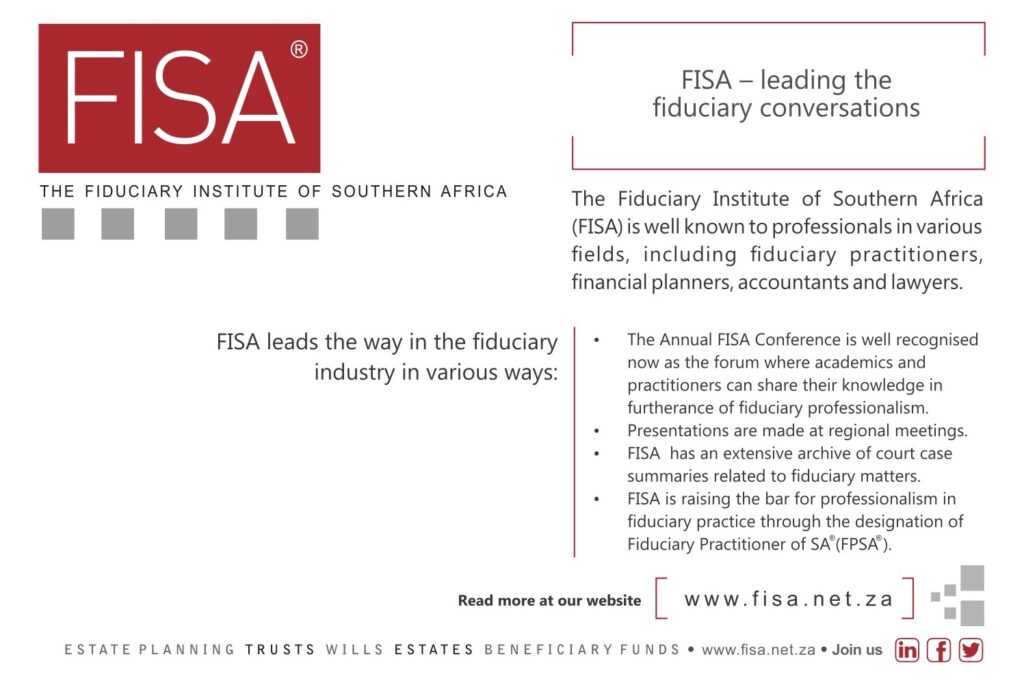Summarised by Louis van Vuren, CEO of FISA.
1. Broadening the concept “spouse” in South African law – Ms Kgopotso Maunatlala (University of Pretoria)

Ms Maunatlala discussed the topic with reference to the Constitutional Court judgement in Bwanya v Master of the High Court, Cape Town and Others and the impact this has on the SA law of succession. She highlighted the difficulties and uncertainty around the difference between mere co-habitation and a life partnership which is intended by both partners to be permanent. This uncertainty can lead to a surviving party in a relationship of sorts to exploit the situation after the death of the other party and claim a life partnership, while it may be difficult to ascertain what the deceased party’s views on this were. She asked the question: “What makes one sure that the deceased would have intended to have their partner inherit from them, especially if the couple never intended to legally formalise their union?”
2. Abuse of personal information – managing online fraud and data breach risks – Mr Steven Powell (ENSafrica)
Mr Powell compared online fraud with Covid and called the former another pandemic that hit the world. Estimates are that cybercrime grew by almost 300% worldwide during Covid. He referred to the different types of data harvesting and online fraud, e.g. social engineering, identity theft, phishing, vishing, smishing, pharming, ransomware, advance fee frauds, man-in-the-middle attacks, romance scams, and 419 scams. He pointed out the dangers of bulk data breaches and the activities of scammers who create complete profiles of persons through collected data. Data breaches in businesses and organisations can also have severe consequences for the entity, with large financial fines and reputational damage and financial losses resulting from breaches due to insufficient security.
3. The rights of trust beneficiaries – Dr Rika van Zyl (School for Financial Planning Law – University of the Free State)
Dr van Zyl explained the rights of trust beneficiaries by way of a case study based on a real-life court case in a brilliant and practical way using citrus fruit as an example of the extent and content of the different rights (or lack thereof) that beneficiaries of a trust could hold. She pointed out how even the highest courts sometimes confuse the different categories of rights. A beneficiary sometimes only has a spes (a hope) to receive something in future, but may think that s/he has a right worthy of protection by law. A contingent right should be distinguished from a vested right, and the acceptance of rights by a beneficiary may or may not (depending on the nature of the right) have consequences for the trustees’ ability to take decisions and/or amend the terms of the trust deed.
4. Unintended consequences of compliance: making fiduciary services unaffordable for the middle market – Mr David Hurford (Fairheads Benefit Services)
Mr Hurford gave an overview of the increased compliance burden placed on trustees due to amendments to the Trust Property Control Act, 1988, and the Financial Intelligence Centre Act, 2001 (FICA), as well as further burdens placed on trustees by changes in practices at the South African Revenue Service (SARS). Failure to comply carry stiff financial penalties and even imprisonment is a possibility. The effect of these new burdens is that the cost of supplying fiduciary services to persons who may need it most in our society is making it almost impossible to do so in a sustainable manner. These include the minor beneficiaries of deceased retirement fund members, claimants against the Road Accident Fund, and in medical negligence claims. One way to attempt to bring down the unit cost is by umbrella trusts under which individual accounts are created for beneficiaries not related to each other.
5. The fiduciary client’s right to privacy – Mr Nel Schoeman (IQ-EQ Guernsey)
Mr Schoeman looked at the European experience and the push-back that is developing against the collection of personal information and the placing of this information in the public domain. He referred to WM (C-37/20) and Sovim SA (C-601/20) v Luxembourg Business Registers where the European Court of Justice ruled that personal information of an individual cannot be a matter of public record. Access to such information can only be based on a legitimate interest and should be limited to, amongst others, entities with anti-money laundering obligations, competent authorities (regulators), investigative journalists and civil society organisations combatting corruption. He also highlighted concerns about the security of records, in the light of the ransomware attack on the South African Department of Justice’s IT systems in 2021, and questioned the necessity to apply the rules about beneficial ownership registers to all types of trust – there are certain trusts where it is impossible to change beneficiaries and the source of the funds are known, e.g. court order trusts originating from Road Accident Fund claims.

FISA – leading the fiduciary conversations
- The Annual FISA Conference is well recognised now as the forum where academics and practitioners can share their
- knowledge in furtherance of fiduciary professionalism.
- Presentations are made at regional meetings
- FISA has an extensive archive of court case summaries related to fiduciary matters
- FISA is raising the bar for professionalism in fiduciary practice through the designation of Fiduciary Practitioner of SA
ESTATE PLANNING. TRUSTS. WILLS.ESTATES. BENEFICIARY FUNDS
6. Regulatory Update – Adv Preesha Seetal (standing in for Ms Penny Roberts – Acting Chief Master of the High Court)
Adv Seetal referred to the launch of an online deceased estate reporting system earlier in October 2023 and the introduction of letters of executorship with a QR code by which the identity of the executor can be verified by financial institutions and other parties with whom the executor has to deal. She also gave an update on progress with the issuing and implementation of a directive following Parliament’s failure to amend the Intestate Succession Act, 1987 and the Maintenance of Surviving Spouses Act, 1990, in the wake of the Bwanya judgement. While the introduction of IT solutions should relieve pressure in the medium term, bandwidth issues and dependence on systems in other civil service departments (e.g. Home Affairs) remain challenging.
7. Ethical dilemmas in compliance requirements for fiduciary practitioners – Adv Abraham Louw SC (Pretoria Society of Advocates)
Adv Louw focussed on the dilemmas that could arise where some compliance requirements in anti-money laundering legislation place impossible burdens on fiduciary practitioners, while ethical codes require them to comply with all legislation. He referred to the impossibility doctrine in law, that the law cannot require anyone to do the impossible – this against the background of the impossibility to comply with some of the requirements in recently amended legislation. A case in point is the fact that the amendments to the Trust Property Control Act, 1988, and the amended regulations under the same act, was put into effect by a proclamation published on 31 March 2023 with effect from 1 April 2023, making it impossible to comply with the legislation.
8. Safeguarding fiduciary investment against risk – South African opportunities – Prof Adrian Saville (Gordon Institute of Business Science)
Prof Saville investigated the contributing factors to investment success and indicated that the most important contributors to sustainable growth in the value of investments is low costs (fees) in the investment vehicle and diversification across asset classes. He pointed out that only 20% of so-called Alpha managers (i.e. investment managers who aim to beat the market) are successful and outperform so-called Beta managers (i.e. investment managers who aim to track the market. This while the latter charge substantially lower fees. He also referred to the value of assets and pointed out that crypto assets have no apparent inherent value, but is based purely on what investors in that market are willing to pay for it. He also pointed out that the single biggest risk is total destruction of capital as there is no recovery possible from that. One of the ways to avoid this is through diversification.
9. Panel discussion
An hour-long panel discussion was a great success again. During this all questions to speakers were facilitated.
- The presentations can be accessed here https://www.fisa.net.za/presentations-given-at-the-2023-fisa-conference-held-17-october/
- And here is info on how to access the recordings on Asset TV – https://www.fisa.net.za/fisa-conference-recordings-available-registrations-re-opened/

